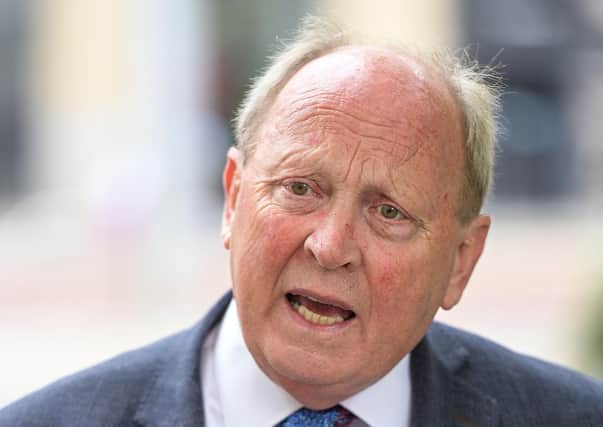TUV bill aimed at removing convicted terrorists from public office defeated at Stormont


Introducing the bill for its second stage debate on Tuesday evening, TUV leader Mr Allister said the proposed legislation is modelled on the bill he brought forward in 2013 – the Special Advisor Act – that led to the removal of Paul Kavanagh from his role as a Spad to Martin McGuinness at Stormont.
Mr Kavanagh was sentenced to five life terms of imprisonment for his role in the murder of three people during a bombing campaign in England in 1981. He served 14 years.
Advertisement
Hide AdAdvertisement
Hide AdOpening the debate, Mr Allister highlighted in graphic detail the fatal injuries suffered by civilians when Mr Kavanagh and other IRA members bombed Chelsea Barracks.
The victims included 59-year-old widow Nora Field and 18-year-old Irish youth John Patrick Breslin.
Mr Allister told MLAs that “victim makers” should not be placed in “privileged positions”.
He said: “I hear talk about respect, about the interests of the ordinary people more important than the political elite.”
Advertisement
Hide AdAdvertisement
Hide AdMr Allister said some of those with serious previous convictions being appointed to public bodies by Sinn Fein is “to demonstrate that there is no remorse and no regret,” and that “elevating them is precisely to make that point”.
But the bill has a clause which would allow a person with such a conviction to continue in post, or be appointed, if an independent panel decides that the person has: shown contrition; taken all reasonable steps to assist in bringing all those involved to justice, bringing some closure for victims, and that the views of any victims have been taken into consideration.
Mr Allister said his bill is “shaped by a moral compass and respects victims, which makes for good law”.
Also speaking during the debate, Christopher Stalford of the DUP said such contentious appointments are causing hurt.
Advertisement
Hide AdAdvertisement
Hide AdHe said: “It is about rubbing people’s noses in it. It is hurting people’s feelings and rubbing salt into the wounds. Victims have had to put up with a lot.”
Former justice minister Claire Sugden said many people who “made sacrifices” to support the Good Friday Agreement in the hope of a better future for their children.
“And as we move forward 23 years later, some of those people are rightly questioning... and asking what those sacrifices were for. Are the structures conducive to the future that we all want?”
Sinn Fein’s Caoimhe Archibald accused Mr Allister of seeking to “undermine the Good Friday Agreement... “including the rights of former prisoners to employment and to play an active role in society”.
She said: “This is an anti-democratic bill”.
Advertisement
Hide AdAdvertisement
Hide AdHer party colleague John O’Dowd also rejected the suggestion that Sinn Fein had a callous approach to terror victims.
“No appointment is made to hurt any victim,” he said.
Contributors to the debate from the SDLP and Alliance also said they could not support the bill.
Colin McGrath of the SDLP said the bill “goes against the Good Friday Agreement,” while Andrew Muir of Alliance said “key departments” at Stormont and the Human Rights Commission were “not engaged” when the bill was being drafted.
He said Alliance will be “unlikely to be able to support the bill at this stage”.
Advertisement
Hide AdAdvertisement
Hide AdLinda Dillon of Sinn Fein said she accepted that “no doubt hurt is caused” when certain appointments are made, “we try to be as sensitive as we can be”.
She added: “Exclusion doesn’t work. The proposer of this bill doesn’t believe in these institutions. The proposer of this bill is on a wrecker’s charter. I am Sinn Fein... and I do care what people think.”